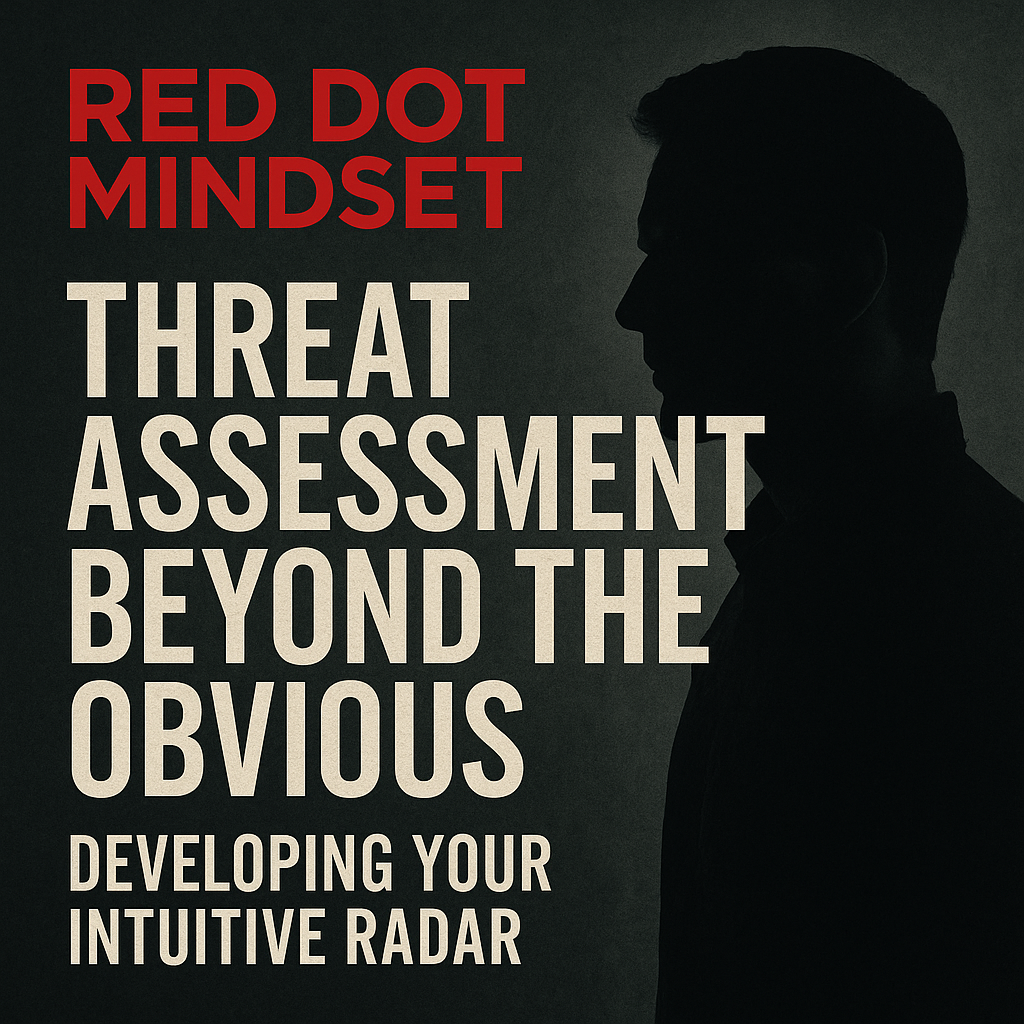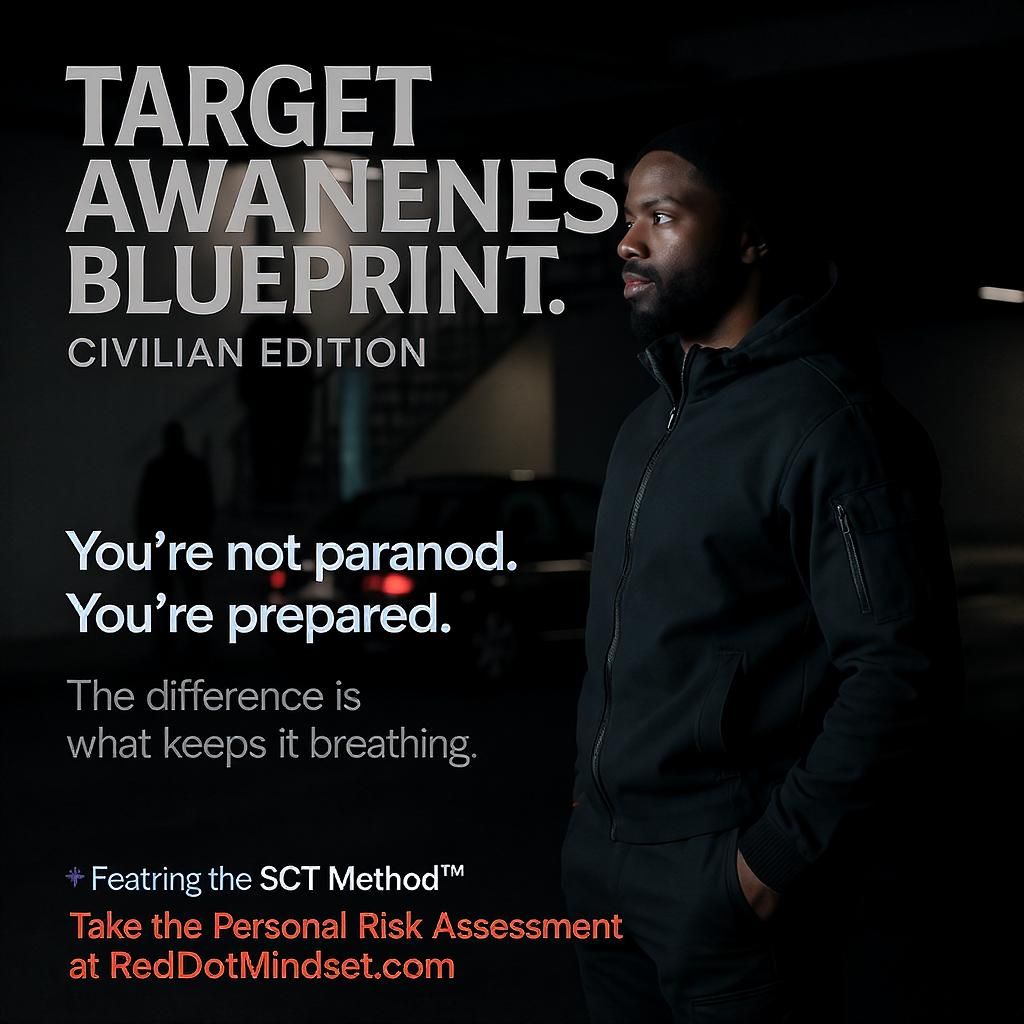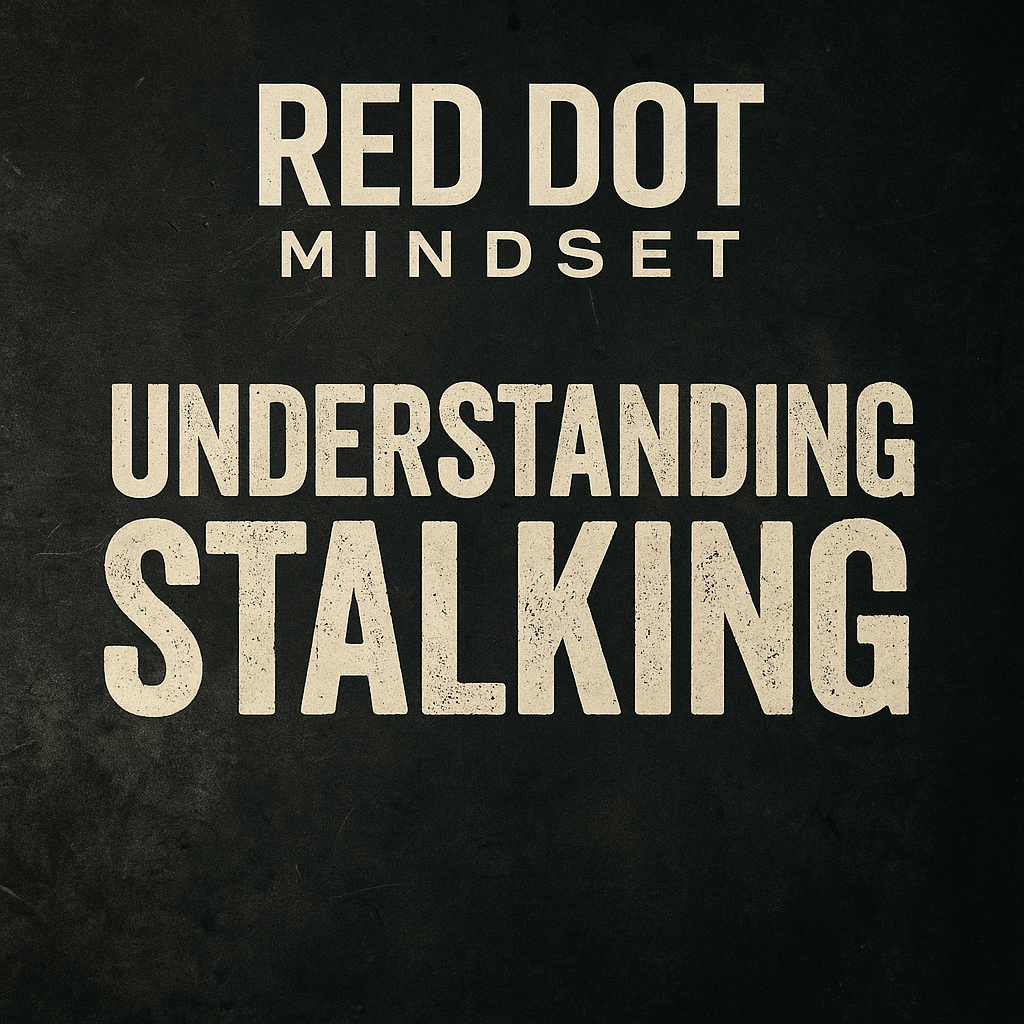Episode Transcript
[00:00:00] Speaker A: Welcome to the Deep Dive. Today we're jumping straight into something really vital for. Well, for everyone, really. Threat assessment.
[00:00:07] Speaker B: Right, but not the kind you see in movies.
[00:00:09] Speaker A: No, exactly. We're going beyond the obvious stuff. We're talking about sharpening your awareness, learning to actually trust your intuition and getting your head in the game, mentally prepared.
[00:00:21] Speaker B: Yeah. You know, we often think security is just about, like, locks and alarms. And those things matter, of course. Sure. But your very first line of defense, the most crucial one, it's your ability to spot a potential issue before it even fully forms.
[00:00:35] Speaker A: And that's exactly what we're focusing on today. I'll be drawing on my own background, you know, military security work. And we're pulling in insights from some really sharp people in behavioral threat assessment. Neuroscience folks like Gavin de Becker, Dr. J. Reed Malloy, Amanda Ripley.
[00:00:52] Speaker B: Yeah, some heavy hitters. We'll definitely touch on de Becker's ideas about intuition's power and Dr. Malloy's work on how our brains sort of instinctively pick up on danger signals.
[00:01:03] Speaker A: And Amanda Ripley's research, too, looking at survivors and how they often acted on these really subtle early warnings.
[00:01:09] Speaker B: Exactly.
[00:01:10] Speaker A: So the mission for this Deep Dive for you, listening is pretty straightforward but really important, helping you understand and really strengthen that innate ability we all have to sense danger.
[00:01:24] Speaker B: It's like building up your own internal, intuitive radar system.
[00:01:28] Speaker A: Yeah, exactly. Picking up those tiny signals that just feel off. Okay, so let's get into it. Where does this intuitive radar actually come from?
[00:01:37] Speaker B: Well, it's basically rooted in the science of our instincts. It's not magic. Those gut feelings, they're essentially your brain processing a ton of information from your environment subconsciously.
[00:01:48] Speaker A: Mostly, it's like this background process, constantly scanning.
[00:01:51] Speaker B: Totally. Your brain's like a supercomputer, always comparing what's happening now against this huge database of past experiences, patterns, normal behavior.
[00:01:59] Speaker A: And when something doesn't quite match, match.
[00:02:00] Speaker B: The pattern, that's when the little alarm bell, your intuition might start ringing.
[00:02:04] Speaker A: Gavin de Becker put it really well on the Gift of Fear. He said something like, intuition is always right in at least two important ways. It is always in response to something. It always has your best interest at heart.
[00:02:17] Speaker B: And the key thing there is listening to it, not just brushing it off as, oh, I'm just being jumpy or whatever.
[00:02:22] Speaker A: And this isn't just, you know, pop psychology. Dr. J. Reed Malloy's work talks about the effective heuristic.
[00:02:29] Speaker B: Yeah, that's basically your brain's rapid fire subconscious danger detector. It's a survival thing, honed over ages.
[00:02:35] Speaker A: Super fast.
[00:02:36] Speaker B: Lightning fast. His book from 2000, Violence, Risk, and Third Assessment, digs into how this system works. Below, conscious awareness, picking up on tiny anomalies that could signal danger.
[00:02:47] Speaker A: Okay, so this is where it gets tricky for a lot of people.
[00:02:48] Speaker B: Right.
[00:02:49] Speaker A: How do you know if it's that valuable? Intuitive hit. A real signal versus just anxiety, worrying about stuff.
[00:02:57] Speaker B: That is such a critical distinction. Anxiety, generally speaking, tends to be more future oriented. It's the what ifs worrying about things down the line.
[00:03:05] Speaker A: Right.
[00:03:06] Speaker B: Intuition, going back to de Becker's point, is a direct response to cues in your immediate environment. Something happening right now that doesn't quite add up.
[00:03:15] Speaker A: Amanda Ripley's book, the Unthinkable has some really powerful examples of this. Yeah, she studied people who survived major disasters, and a common thread was acting on these subtle feelings, this unease, even when things looked okay on the surface.
[00:03:29] Speaker B: Exactly. Survivors often talk about that feeling that something just wasn't right. Even if they couldn't explain why immediately they listened to that inner nudge, that intuition, and it often saved them. Her book, the Unthinkable, you can find tons of examples like that. It really drives home that intuition is grounded in the present moment.
[00:03:47] Speaker A: So, look, the aim isn't to make you paranoid or constantly on edge.
[00:03:51] Speaker B: Not at all.
[00:03:51] Speaker A: It's about tuning that dialogue, refining your ability to recognize genuine signals without getting swamped by general worry. So, practically speaking, how can you actually start to, like, build this intuitive radar?
[00:04:04] Speaker B: Well, it's definitely an active process. It takes conscious effort, training your awareness, and learning to give those initial feelings some weight. There are definitely practical things you can do.
[00:04:15] Speaker A: Okay, like what? Maybe starting with just understanding what's normal. Pattern recognition.
[00:04:21] Speaker B: Precisely. That's foundational. You need to actively study your everyday environments. Your commute, where you work, your neighborhood.
[00:04:29] Speaker A: Really look at them.
[00:04:30] Speaker B: Yeah. Notice the usual flow of traffic, how crowds usually behave, the typical sounds. Establish your baseline. Because the key is, once you know.
[00:04:38] Speaker A: What normal looks like, the abnormal stands out like a red flag.
[00:04:42] Speaker B: Exactly. Anything unusual, Someone acting strangely, a weird noise, a car parked somewhere it shouldn't be. It'll pop out much more clearly.
[00:04:50] Speaker A: Okay. Yeah.
[00:04:51] Speaker B: Another really good habit is setting mental checkpoints. Like when you walk into a building, consciously make a note. Where are the exits? Glance around, notice who's there. Mentally rehearse. Just quickly, okay, if something went wrong, where would I go?
[00:05:04] Speaker A: Again, not paranoia, just preparation. Like having a mental fire drill ready.
[00:05:09] Speaker B: Exactly. It creates a framework, so you're not starting from zero if something does happen.
[00:05:14] Speaker A: Makes sense.
[00:05:14] Speaker B: And I also really Recommend tracking your gut feelings. Keep a log. Maybe just mentally. Or notes on your phone.
[00:05:23] Speaker A: Oh, interesting.
[00:05:24] Speaker B: Yeah. When you get a strong feeling about a person or a situation, note it down. What was the context? What did you feel?
[00:05:30] Speaker A: Mm.
[00:05:31] Speaker B: Then revisit it later. Did your intuition turn out to be right? Doing this helps build trust in those signals.
[00:05:37] Speaker A: It helps you tell the difference between real intuition and. And just noise.
[00:05:42] Speaker B: Exactly. You're calibrating your internal detector.
[00:05:44] Speaker A: Okay.
[00:05:45] Speaker B: And one more thing. Talk about your observations. If something feels off, discuss it with someone you trust. Get another perspective.
[00:05:53] Speaker A: Yeah, that can help you spot your own blind spots. Right. Maybe you misinterpreted something. Or maybe they see something you missed.
[00:05:59] Speaker B: Precisely. It's like stress testing your assumptions against someone else's view.
[00:06:03] Speaker A: Okay, this is all really useful for building awareness, but there's this other concept we need to talk about. The safety trap.
[00:06:10] Speaker B: Ah, yes, that's a really important one. Highlighted by Courson Security Group.
[00:06:14] Speaker A: Explain that. What is the safety trap?
[00:06:16] Speaker B: It's basically the idea that feeling safe can actually make you less safe.
[00:06:20] Speaker A: How does that work?
[00:06:22] Speaker B: Because when we feel safe, our vigilance naturally drops. We relax our guard.
[00:06:28] Speaker A: Okay, I see, like, walking into a supermarket with security cameras everywhere. You might think, great, cameras. I'm safe and stop paying as much attention.
[00:06:35] Speaker B: Exactly. But as Corson Security points out, those cameras, they're mostly there to watch the merchandise, prevent shoplifting. Not necessarily for your personal safety.
[00:06:45] Speaker A: So the visible security gives a false sense of security.
[00:06:48] Speaker B: It can. Yeah. Think about your ring doorbell at home. It adds security there, but it doesn't mean you're automatically safe walking down the street.
[00:06:56] Speaker A: Yeah.
[00:06:56] Speaker B: We see these things and subconsciously think, okay, someone else is handling security. And we lower our own awareness.
[00:07:02] Speaker A: Complacency creeps in.
[00:07:04] Speaker B: Right. Course insecurity uses an example of a security guard at a pool who seems totally zoned out. Missed. Obvious warning signs. It just shows that direct link. Lower vigilance, higher risk. When we feel too safe, we stop looking for those subtle cues.
[00:07:19] Speaker A: And that brings us to being present. Especially in those. What do you call them? Transitional zones.
[00:07:26] Speaker B: Yeah, transitional zone. Those moments when you're moving from one environment to another.
[00:07:30] Speaker A: Like walking from the grocery store back to your car.
[00:07:32] Speaker B: Exactly. Or just stepping out of your house onto the street. In those moments, our minds are often elsewhere. Right. Thinking about what we just did, what we need to do next. Maybe scrolling on our phone.
[00:07:44] Speaker A: Yeah. Totally distracted.
[00:07:46] Speaker B: And that's often when we're most vulnerable. Course insecurity really emphasizes being present, being aware during those transitions. Just Focusing on your immediate surroundings for those few moments.
[00:07:58] Speaker A: Because if someone is looking for a.
[00:08:00] Speaker B: Target, they're often looking for the easiest opportunity. Likelihood of success is huge for them.
[00:08:05] Speaker A: So you don't want to look like an easy target.
[00:08:07] Speaker B: Right, which is why adopting what's called a positive protective posture is helpful. Simple stuff, really. Like walking with confidence, head up, making brief eye contact with people you pass. Just generally looking aware.
[00:08:20] Speaker A: It removes that anonymity.
[00:08:21] Speaker B: Exactly. Course insecurity makes the point. Predators prefer targets who seem oblivious, lost in their own world. Someone who looks alert is way less appealing.
[00:08:32] Speaker A: Okay, shifting gears slightly, but still related social media. How does that play into vulnerability?
[00:08:41] Speaker B: Well, of course, insecurity is clear. Oversharing doesn't directly cause you to be targeted. It's not like posting a vacation pic makes someone rob you.
[00:08:48] Speaker A: Right.
[00:08:49] Speaker B: But it can provide information that makes it easier for someone who already wants to target you to be successful.
[00:08:54] Speaker A: Ah, okay. Like giving them intel.
[00:08:56] Speaker B: Precisely. They share a pretty chilling example of a couple basically live blogging their trip, giving thieves a real time countdown for when the house would be empty.
[00:09:06] Speaker A: Wow.
[00:09:06] Speaker B: Okay, so the advice is pretty simple. Share after the event, not during.
[00:09:10] Speaker A: Post the vacation photos when you're back home.
[00:09:11] Speaker B: Exactly. And they also recommend doing regular social media audits. Go through your profiles, remove old stuff, unnecessary personal details that are just hanging out there publicly.
[00:09:20] Speaker A: Good idea. And they even suggest Googling yourself. Right. And your address.
[00:09:24] Speaker B: Yeah. See what information is publicly available about you. You might be surprised. And then take steps to get it removed if you can.
[00:09:31] Speaker A: Okay, so that same principle, trust but verify, applies online too, Especially with things like dating apps.
[00:09:38] Speaker B: Absolutely. Course. And security connects this directly to online dating. And it loops back to that difference between feeling safe and actually being secure.
[00:09:47] Speaker A: Right.
[00:09:48] Speaker B: Dating apps can sometimes lull you into that safety, safety trap because you're interacting through a screen, maybe feeling a bit detached or protected.
[00:09:55] Speaker A: The profile isn't always the reality.
[00:09:57] Speaker B: Definitely not. Profiles are curated. Right? They're the highlight reel. People aren't always who they seem online, so be cautious. Yeah. Be wary of profiles that seem too perfect. Or if someone pushes for personal details.
[00:10:09] Speaker A: Really fast in the first meeting.
[00:10:11] Speaker B: Always public place. Always tell a friend where you're going, who you're meeting, when you expect to be back. And crucially, listen to your gut. If something feels off about the person, online or in person, don't ignore it.
[00:10:23] Speaker A: Okay, last big topic here, but really important. This idea of being disagreeable and setting boundaries.
[00:10:29] Speaker B: Yes, this is a powerful concept from course insecurity. And disagreeable here doesn't mean being nasty or argumentative. Just cause he means it means prioritizing your own well, being your own safety, and having the assertiveness to enforce your boundaries, even if it feels awkward, even if you worry about offending the other person.
[00:10:50] Speaker A: So your willingness to protect yourself needs to be greater than your unwillingness to seem impolite.
[00:10:56] Speaker B: That's the core of it. Because people who intend harm often test boundaries. They push a little, see how you react, see if you let them cross the line.
[00:11:04] Speaker A: There's that movie bombshell.
[00:11:05] Speaker B: Yeah, that's a great example they use. You see the contrast, right? Megynteli being very direct and pushing back.
[00:11:10] Speaker A: Against inappropriate behavior versus Margot Robbie's charact character. Initially wanting to be polite, not wanting to cause trouble even when things were clearly wrong.
[00:11:20] Speaker B: Right. Knowing your limits and being firm about them sends a very clear signal. Don't negotiate against yourself.
[00:11:26] Speaker A: Course insecurity connects this to, like, confidence and empowerment. Even calling it sexy.
[00:11:32] Speaker B: Yeah. Having the courage of your convictions, being willing to call out bad behavior, that is empowering. It shows you're in control of your own agency.
[00:11:41] Speaker A: It's about owning your space, your choices.
[00:11:43] Speaker B: Exactly. Being disagreeable in this context means you're not letting someone else dictate your comfort or safety level.
[00:11:51] Speaker A: Okay, so wrapping this all up, then, as we finish this deep dive, the big takeaway seems to be your brain.
[00:11:59] Speaker B: It really is. Your brain is your first weapon, your last line of defense. Not just in some crazy high threat situation, but everyday life.
[00:12:08] Speaker A: Don't ignore those little intuitive signals, those whispers.
[00:12:11] Speaker B: They might be the only warning you get. Learning to hear them and learning to trust them is absolutely fundamental in building.
[00:12:17] Speaker A: This intuitive radar, this awareness. It's not about fear.
[00:12:20] Speaker B: No. It's about preparation. It's about being mindfully present. Tactical mindfulness, you could say. It's the gray matter ops way, really.
[00:12:27] Speaker A: By practicing this stuff, paying attention, trusting your gut, setting boundaries.
[00:12:31] Speaker B: Yeah.
[00:12:31] Speaker A: You're empowering yourself.
[00:12:32] Speaker B: You navigate the world with more safety, more confidence. Absolutely.
[00:12:36] Speaker A: Well, if you found this deep dive helpful, please do subscribe. So you catch our future ones on mindset and preparedness and leaving a review.
[00:12:43] Speaker B: Or sharing this with someone you think might benefit, that really helps us out too.
[00:12:47] Speaker A: It lets us keep bringing you this kind of analysis. Okay. Until next time, train the mind. Control the moment. And remember, awareness is armor.




